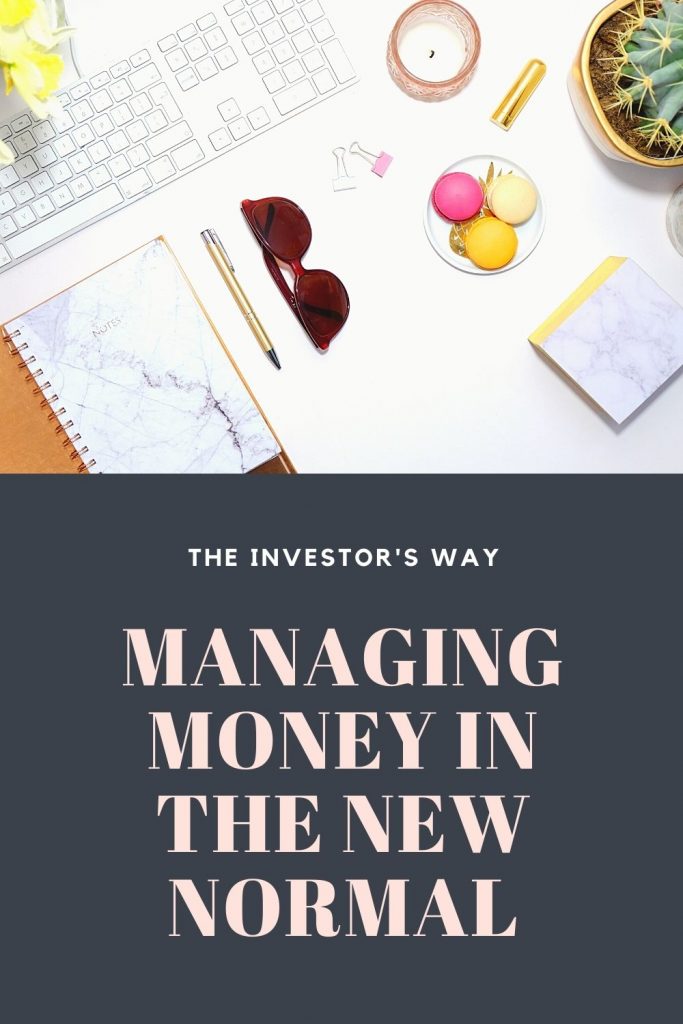The new normal is a phrase we are hearing more and more, and how to be managing money as a result is raising lots of questions.
What the new normal means and is probably still hasn’t been defined. It seems like we are some way from knowing what that will be. But one thing is certain, the old way we did life is unlikely to return any time soon, if at all.

We are seeing more and more workers doing days at home, which is likely to continue, and the job market as a result is likely to change as well.
We are also seeing many people out of work for the first time in their working history. People who are highly skilled, hardworking, and driven.
So let’s take a look at what this means for managing money and what you can do to move with the times.
New Normal – The First Priority
Obviously, if your job circumstances have changed, then your priorities are going to be a little different than they would have been.
The key in the short term is to secure your money circumstances. Speak with your bank about mortgage payments and what can be done, or your landlord about any assistance that is available. As your biggest monthly expense, your home is the most important item to have some certainty and relief.
If you have followed The Investor’s Way for any time you will know that the single most important first step to managing money and your financial health, is to have an emergency buffer.
The past few years when people have been losing jobs is a perfect example of when the emergency buffer becomes your safety net.
So if you haven’t got your emergency buffer in place yet, and you are able, the first priority is to start to build it up. Start with the goal of accumulating three months of your living expenses. The ultimate aim should be six months to provide that buffer, especially for a pandemic.
A Plan for You Money – The Second Priority
The second priority is to put a plan together for your money.
Whether your employment has changed or not, now is a great time to take a look at your expenses. Really spend the time to go through your expenses and see if there are items that you can go without.
One of the things I have done on a consistent basis is to look at those expenses that you kind of forget about because they just happen monthly or quarterly, like insurance, electricity, and internet.

Making a few phone calls to these providers has resulted in some significant discounts or reductions in premiums and monthly charges. This should be your next step to managing money in the new normal.
A part of having a plan for your money is also making sure that it is where you need it to be when you need it. When bills come in, make sure there is money set aside to meet the bill.
When managing money, the biggest trap is overlooking those expenses that are coming in every week, like groceries. This tends to result in money stress when there isn’t enough set aside for these larger more irregular costs.
So your second priority is to make a plan for where you need your money to be. Managing money with a plan means having different bank accounts for specific purposes, like your bills, living expenses, planned future expenses (these are things like gifts, Christmas, holidays etc.), and investing.
New Normal Money – The Third Priority
Now this is likely the last thing on your mind if you are struggling to get by at the moment. If your circumstances have changed, it may be the impact of the interest rate rises or a change to employment status, then paying yourself is the last thing you are thinking about, I get that.
If that is you, then I would spend all my energy on the first two priorities, with particular attention on reducing your costs wherever you can. Make those calls, make cutbacks where you can, and bunker down while you weather the storm. I know it isn’t easy, and it’s stressful, so be sure to manage your mental health as well. Get outside when you can and do some exercise, it’s great for clearing your head.
These times will pass, and you can come back to this post when the time is right to consider the third priority of managing money in the new normal.
Paying yourself first from your income needs to be a habit that you make automatically. Just do it, there are no ifs and buts and no sugarcoating it. This is the ONLY secret or magic pill that the wealthy do that separates them from everyone else. Harsh, but reality.
This isn’t something that will change or needs to change in the new normal.
Once you have some money accumulated in your freedom account, where you ‘pay yourself first’ money is now going with your new money plan, it is time to get it working for you.
Investing in the New Normal
Your freedom account is all about getting your money working hard for you so that you eventually don’t have to.
For the past 12 months, I have been telling customers that they need a balanced portfolio of investment-grade assets, that includes some money in safety assets.
Safety assets are those investments that perform well when everything else is going up the shitter, so to speak.
If you have been watching the markets, you will have seen the safety assets of gold and silver on a tear recently. Both are moving up as fear enters the markets, this is normal for these assets, as they provide protection when other markets crap themselves (that’s the technical term).

And it’s not too late to add these to your portfolio, there are more gains to come.
Beyond the flight to safety, the question becomes what else will thrive in the new normal.
I mentioned recently looking for things that will do well despite everything that is going on around the world. These are companies that are providing solutions for what people need and want right now.
Typically, in the stock market, they are called counter cyclical. That is, stocks that do well when everything else is struggling.
One thing for sure is that any company related to food provision is going to do well, like your major grocery stores. Another less obvious one is the home improvement industry. Any supplier or retailer related to these two industries is going to be doing well.
The amount of money being pumped into infrastructure in coming years by governments to stimulate economies will also mean that any company related to construction is also likely to do well, although be careful not to confuse this with residential construction where things are looking less exciting.
This leads me to take a look at property as well. What’s the likely scenario for property in the short term?
We all saw the ridiculous headlines about property falling 30% at the start of the pandemic, and now know that is even less likely than it was at the time.
There is no doubt some pockets of the property market will see a drop in median prices, I’ve seen it in my own portfolio. However, the longer-term view is that property will also recover quickly and return to a more normal growth trajectory, that is, on a gradual growth path.
Conclusion
So the big takeaway from managing money in the new normal is that nothing really changes. The key priorities remain the same. Protect yourself, have a plan, and get your money working for you.
When looking to get your money working for you, look at those asset classes that will do well in the new normal. To work out what they are, look at how the world is changing.
For example, there is a very good chance that large office buildings are going to become a lot less full or in demand. Property trusts that invest in city office space are going to be under the pump.
On the flip side, technology companies are going to continue to boom. Just take a look at Amazon. Jeff Bezos’ net worth during the online shopping boom of the pandemic has grown exponentially. There are some clues on what is working and what won’t, are you ready to see them and take advantage? Let me know in the comments.
To claim your FREE Smart Investor Call at a time that suits you, click the link here. On this call we will create a plan to grow your wealth and secure your financial future.
